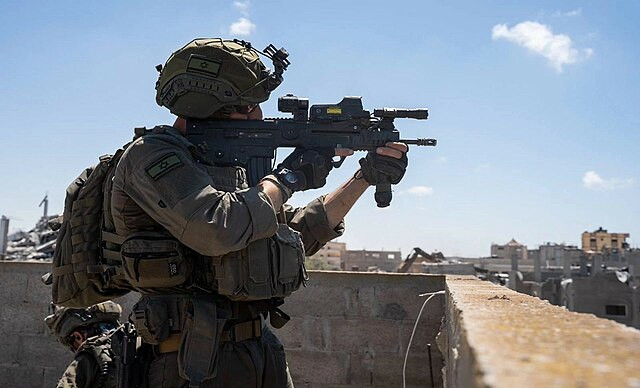Israeli forces intensified their military campaign in Gaza this week, pushing deeper into central and southern parts of the territory as they engaged in fierce battles with Hamas fighters. The escalation came as Palestinian health officials reported at least 27 additional deaths across Gaza on Thursday, bringing the toll from Israeli airstrikes to over 40,000 since the conflict erupted in October.
Meanwhile, U.S. President Joe Biden renewed his calls for Israeli Prime Minister Benjamin Netanyahu to urgently pursue a ceasefire and negotiate the release of hostages held by Hamas, underscoring the international pressure on Israel to curb the violence.
The ongoing conflict has seen Israel and Hamas locked in a deadly stalemate, with both sides unwilling to yield ground in the face of months-long negotiations over a potential ceasefire. Despite repeated efforts, talks have repeatedly broken down, as Israel insists on the complete dismantling of Hamas as a military threat, while Hamas demands a full withdrawal of Israeli forces from Gaza and the release of Palestinian prisoners.
In the northern Gaza town of Beit Lahiya, Israeli airstrikes targeted residential areas, resulting in the deaths of 11 civilians, including women and children. According to the Hamas-run Civil Emergency Service, the bodies of some victims were burned beyond recognition. In Al-Maghazi camp, a strike killed six people, including a local journalist, further highlighting the severe toll on non-combatants in the densely populated enclave. The southern city of Khan Younis also witnessed the deaths of five Palestinians in separate airstrikes, as health officials scrambled to cope with the mounting casualties.
The Israeli military reported that its forces had intensified operations in Deir Al-Balah, a city in central Gaza, as well as in Khan Younis, dismantling what it described as dozens of military structures and killing 50 militants in the Rafah area over the past 24 hours. Meanwhile, the armed wing of Hamas claimed it had ambushed an Israeli unit in Rafah, causing casualties among Israeli soldiers, though these claims could not be independently verified.
In Washington, Biden's call with Netanyahu on Wednesday followed a whirlwind diplomatic tour by U.S. Secretary of State Antony Blinken, who returned from the region without achieving a breakthrough. The White House emphasized the urgency of finalizing a truce and securing the release of hostages, while Israel remained firm in its position that any pause in the fighting would only be temporary if Hamas is not entirely neutralized.
On the ground, the situation in Gaza continues to deteriorate. Israeli tanks have moved further into the central town of Deir Al-Balah, home to around one million residents and displaced persons. Residents report that tanks have cut off roads connecting the city to Khan Younis, and heavy fire from tanks and drones has forced many families to flee. Imad Al-Ghalayeeni, a resident of Khan Younis, described the harrowing experience of fleeing under fire: "Last night, drones began firing towards the tents... the noise of tanks got louder as they advanced closer, so we decided to run," he told Reuters by phone. "We are five families, 48 persons... we ran to the beach, some slept on the road, others onshore, just on the sand with no tents, no blankets or mattresses."
The despair among Gaza's population is palpable, with many residents expressing disillusionment with the protracted ceasefire talks. "These talks are time-wasting, and they aim to give Netanyahu the time he needs to continue what he is doing," said Al-Ghalayeeni. "There is no place the tanks didn't enter, or bomb, and there is nowhere safe anymore."
The humanitarian crisis in Gaza continues to worsen, with most of the enclave's 2.3 million residents having been displaced multiple times since the war began. Even areas designated as "safe zones" have not been spared from the violence, and there are reports of civilian casualties even in these locations. In the northern Gaza camp of Jabalia, health officials have been forced to suspend several services at a hospital due to a lack of fuel, with only lifesaving treatment still being provided.
As the conflict drags on, the international community remains deeply concerned about the human cost. The United Nations has warned that Israeli evacuation orders are pushing civilians into overcrowded areas along the Gaza coast, exacerbating the already dire humanitarian situation. U.N. estimates suggest that 90% of Gaza's population has been displaced at least once since the war began, with no end to the conflict in sight.




